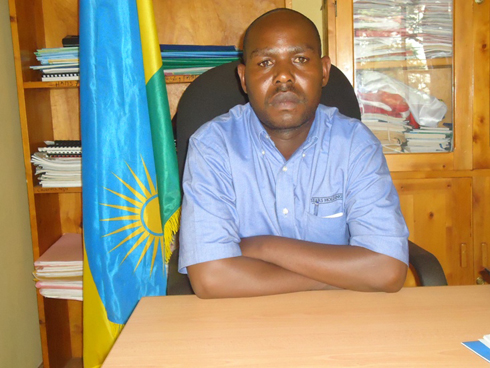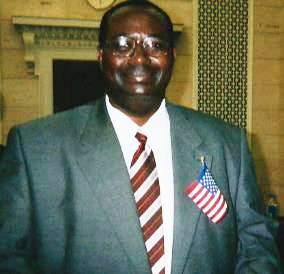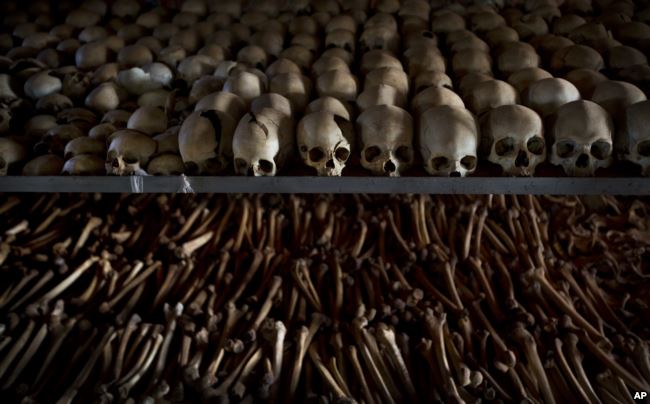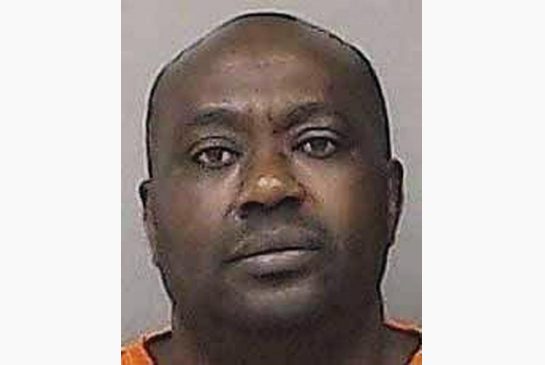CEDAR RAPIDS, IOWA — A Rwandan man who lied to gain entry into the U.S. after helping slaughter scores of people during his country’s 1994 genocide must serve 15 years behind bars before facing deportation, a judge ruled Thursday.

Gervais Ngombwa in this undated picture, showing him back in Rwanda.
Gervais Ngombwa, 57, “is a violent individual who presents a danger to the community,” U.S. District Judge Linda Reade said.
“There isn’t a doubt in my mind that he was an active participant, indeed a leader, of the genocide in Rwanda,” Reade told a courtroom in Cedar Rapids, Iowa, where Ngombwa lived and raised a family for two decades.
The sentence following his conviction for immigration fraud capped a case that the Anti-Defamation League called one of the most significant U.S. human rights prosecutions in recent years.
Killings, thefts
Federal prosecutor Rich Murphy said Ngombwa was a local leader of an extremist party during the genocide, in which the majority Hutu killed an estimated 800,000 Tutsis in an effort to destroy their ethnic rivals after peace talks collapsed. He said Ngombwa had wielded a machete as he personally butchered Tutsis, looted properties and drove a youth militia around the country to carry out mass killings of people seeking refuge in locations such as churches and a children’s orphanage.
Murphy glared at Ngombwa across the courtroom as he described what he called the “unspeakable acts” he committed during the 100-day genocide that killed one-tenth of the country’s population.
Murphy said Ngombwa had his own home and family protected by military forces “while he went out and killed.” Ngombwa fled the country rather than face justice, falsely claiming he was a genocide victim in order to gain U.S. refugee status for himself, his wife and several relatives, Murphy said.

Gervais “Ken” Ngombwa at his citizenship ceremony in November 2004
Victims’ skulls
Murphy displayed a photo of skulls of victims that showed they had been clubbed to death as he urged Reade to consider their suffering in sentencing Ngombwa. He compared Ngombwa to notorious criminals such as mob boss Whitey Bulger, who lived in hiding after committing “unfathomable” acts of violence.

FILE – Skulls and bones of some of those killed in Rwanda’s genocide are seen at a memorial shrine at a Catholic church in Ntarama, Rwanda, April 4, 2014.
Reade said she was convinced of Ngombwa’s guilt in the genocide but that she’d leave punishment for those acts to authorities in Rwanda, where he’s under indictment and to where he will be deported after his sentence is served. She focused on the need to protect the public and the “aggravating factor” that several relatives had gained entry into the U.S. through Ngombwa’s lies.
The genocide allegations shocked acquaintances of Ngombwa in Iowa, where he was known as “Ken,” a devout Christian and a father of eight successful children.
U.S. Immigration and Customs Enforcement, which has a unit dedicated to catching alleged human rights violators, has arrested 380 such individuals since 2003. But the prosecution was the first of its kind in the Northern District of Iowa, said U.S. Attorney Kevin Techau.
Ngombwa was convicted at trial of falsely telling authorities he was the brother of an exiled Rwandan prime minister and therefore subject to persecution. That claim was the basis of the decision to allow his family to resettle in the U.S. in 1998 from a refugee camp in Tanzania, where his family had been living.
Arson, fraud arrest
Ngombwa worked as a school janitor and hotel employee and was active in his church. He had a clean record until 2013, when he was arrested for arson and insurance fraud after police said he intentionally burned down his home, which was built by Habitat for Humanity.
By then, investigators were looking into allegations that Ngombwa had participated in the genocide. He was indicted on immigration charges in 2014 after an investigation that included U.S. agents based in South Africa, who traveled to find witnesses in Rwanda.
Ngombwa’s attorney, Ray Sheets, said his client denies being involved in the genocide or being a leader in the extremist MDR-Power party. He said Ngombwa was known as a good and kind person to his supporters.
At trial, Ngombwa denied claiming he was the brother of former Prime Minister Faustin Twagiramungu, who lives in exile in Belgium. He insisted he meant he was Twagiramungyu’s “political brother,” agreeing with his positions.
Ngombwa waved to his children and friends as he slowly walked out of the courtroom in shackles.
Rwanda Govt urges US to extradite Genocide convict Ngombwa
His paperwork came on the spot after the Rwandan government requested their US counterparts in 2014, informing them of the man’s outstanding warrant of arrest over crimes he had committed during the 1994 Genocide against the Tutsi.
According to Faustin Nkusi, the National Public Prosecution Authority spokesperson, Ngombwa was convicted of four charges of genocide, extermination, crimes against humanity and murder as a crime against humanity.
“We have been in negotiations for some time with the US government and our request to have the person extradited and tried here in Rwanda remain unchanged,” Nkusi said, adding that the US government did not react to their 2014 indictment request possibly because they were still carrying out their own investigations.
Since he was convicted in absentia by the now closed Gacaca semi-traditional judicial system, the suspect has the right to seek retrial in a conventional court to be able to defend himself.
A former influential businessman in Bugesera, Ngombwa is, among others, accused of having spearheaded bloody attacks on the former Ntarama Catholic Church – which has since been converted into a Genocide memorial site – where more than 5,000 innocent Tutsi were killed.
According to various witness accounts, Ngombwa was widely known in Nyamata town and its surroundings where he participated in killings during the Genocide.

